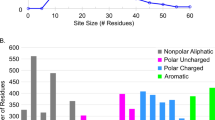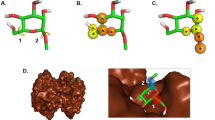Abstract
Two families of binding affinity estimation methodologies are described which were utilized in the SAMPL3 trypsin/fragment binding affinity challenge. The first is a free energy decomposition scheme based on a thermodynamic cycle, which included separate contributions from enthalpy and entropy of binding as well as a solvent contribution. Enthalpic contributions were estimated with PM6-DH2 semiempirical quantum mechanical interaction energies, which were modified with a statistical error correction procedure. Entropic contributions were estimated with the rigid-rotor harmonic approximation, and solvent contributions to the free energy were estimated with several different methods. The second general methodology is the empirical score LISA, which contains several physics-based terms trained with the large PDBBind database of protein/ligand complexes. Here we also introduce LISA+, an updated version of LISA which, prior to scoring, classifies systems into one of four classes based on a ligand’s hydrophobicity and molecular weight. Each version of the two methodologies (a total of 11 methods) was trained against a compiled set of known trypsin binders available in the Protein Data Bank to yield scaling parameters for linear regression models. Both raw and scaled scores were submitted to SAMPL3. Variants of LISA showed relatively low absolute errors but also low correlation with experiment, while the free energy decomposition methods had modest success when scaling factors were included. Nonetheless, re-scaled LISA yielded the best predictions in the challenge in terms of RMS error, and six of these models placed in the top ten best predictions by RMS error. This work highlights some of the difficulties of predicting binding affinities of small molecular fragments to protein receptors as well as the benefit of using training data.










Similar content being viewed by others
References
Andrusier N, Mashiach E, Nussinov R, Wolfson HJ (2008) Proteins Struct Func Bioinfo 73(2):271
Halperin I, Ma BY, Wolfson H, Nussinov R (2002) Proteins Struct Func Genet 47(4):409
Leach AR, Shoichet BK, Peishoff CE (2006) J Med Chem 49(20):5851
Warren GL, Andrews CW, Capelli AM, Clarke B, LaLonde J, Lambert MH, Lindvall M, Nevins N, Semus SF, Senger S, Tedesco G, Wall ID, Woolven JM, Peishoff CE, Head MS (2006) J Med Chem 49(20):5912
Kolb P, Irwin JJ (2009) Curr Top Med Chem 9(9):755
Deng YQ, Roux B (2009) J Phys Chem B 113(8):2234
Faver JC, Benson ML, He X, Roberts BP, Wang B, Marshall MS, Sherrill CD, Merz KM (2011) PLoS ONE 6(4):e18868
Faver JC, Benson ML, He X, Roberts BP, Wang B, Marshall MS, Kennedy MR, Sherrill DC, Merz KM (2011) J Chem Theor Comput 7(3):790
Merz KM (2010) J Chem Theor Comput 6(5):1769
Zheng Z, Merz KM (2011) J Chem Inf Model 51(6):1296
Benson ML, Smith RD, Khazanov NA, Dimcheff B, Beaver J, Dresslar P, Nerothin J, Carlson HA (2008) Nucleic Acids Res 36:D674
Hu LG, Benson ML, Smith RD, Lerner MG, Carlson HA (2005) Proteins Struct Func Bioinf 60(3):333
Glide. Version 5.7. New York, NY: Schrödinger, LLC; 2011
Friesner RA, Banks JL, Murphy RB, Halgren TA, Klicic JJ, Mainz DT, Repasky MP, Knoll EH, Shelley M, Perry JK, Shaw DE, Francis P, Shenkin PS (2004) J Med Chem 47(7):1739
Friesner RA, Murphy RB, Repasky MP, Frye LL, Greenwood JR, Halgren TA, Sanschagrin PC, Mainz DT (2006) J Med Chem 49(21):6177
Halgren TA, Murphy RB, Friesner RA, Beard HS, Frye LL, Pollard WT, Banks JL (2004) J Med Chem 47(7):1750
Park MS, Gao C, Stern HA (2011) Proteins Struct Func Bioinf 79(1):304
Stewart JJP (2008) MOPAC2009. Colorado. Stewart Computational Chemistry, Springs, CO, USA
Korth M, Pitonak M, Rezac J, Hobza P (2010) J Chem Theor Comput 6(1):344
Fanfrlik J, Bronowska AK, Rezac J, Prenosil O, Konvalinka J, Hobza P (2010) J Phys Chem B 114(39):12666
Ucisik MN, Dashti DS, Faver JC, Merz KM (2011) J Chem Phys 135:085101
Baum B, Muley L, Smolinski M, Heine A, Hangauer D, Klebe G (2010) J Mol Biol 397(4):1042
MacroModel. Version 9.9. New York, NY: Schrödinger, LLC; 2011
Prime. Version 3.0. New York, NY: Schrödinger, LLC; 2011
Jacobson MP, Friesner RA, Xiang ZX, Honig B (2002) J Mol Biol 320(3):597
Jacobson MP, Pincus DL, Rapp CS, Day TJF, Honig B, Shaw DE, Friesner RA (2004) Proteins Struct Func Bioinf 55(2):351
Klamt A, Schuurmann G (1993) J Chem Soc-Perkin Trans 2(5):799
Srinivasan J, Cheatham TE, Cieplak P, Kollman PA, Case DA (1998) J Am Chem Soc 120(37):9401
Massova I, Kollman PA (1999) J Am Chem Soc 121(36):8133
Kollman PA, Massova I, Reyes C, Kuhn B, Huo SH, Chong L, Lee M, Lee T, Duan Y, Wang W, Donini O, Cieplak P, Srinivasan J, Case DA, Cheatham TE (2000) Account Chem Res 33(12):889
Hornak V, Abel R, Okur A, Strockbine B, Roitberg A, Simmerling C (2006) Proteins Struct Func Bioinfo 65(3):712
Wang RX, Fang XL, Lu YP, Wang SM (2004) J Med Chem 47(12):2977
LigPrep. Version 2.5. New York, NY: Schrödinger, LLC; 2011
Katz BA, Elrod K, Verner E, Mackman RL, Luong C, Shrader WD, Sendzik M, Spencer JR, Sprengeler PA, Kolesnikov A, Tai VWF, Hui HC, Breitenbucher G, Allen D, Janc JW (2003) J Mol Biol 329(1):93
Cui J, Marankan F, Fu WT, Crich D, Mesecar A, Johnson ME (2002) Bioorg Med Chem 10(1):41
Whitlow M, Arnaiz DO, Buckman BO, Davey DD, Griedel B, Guilford WJ, Koovakkat SK, Liang A, Mohan R, Phillips GB, Seto M, Shaw KJ, Xu W, Zhao ZC, Light DR, Morrissey MM (1999) Acta Crystallogr Sect D-Biol Crystallogr 55:1395
Toyota E, Ng KKS, Sekizaki H, Itoh K, Tanizawa K, James MNG (2001) J Mol Biol 305(3):471
Fokkens J, Klebe G (2006) Angewandte Chem Int Ed 45(6):985
Presnell SR, Patil GS, Mura C, Jude KM, Conley JM, Bertrand JA, Kam CM, Powers JC, Williams LD (1998) Biochemistry 37(48):17068
Katz BA, Mackman R, Luong C, Radika K, Martelli A, Sprengeler PA, Wang J, Chan HD, Wong L (2000) Chem Biol 7(4):299
Leiros HKS, Brandsdal BO, Andersen OA, Os V, Leiros I, Helland R, Otlewski J, Willassen NP, Smalas AO (2004) Protein Sci 13(4):1056
Dullweber F, Stubbs MT, Musil D, Sturzebecher J, Klebe G (2001) J Mol Biol 313(3):593
Maignan S, Guilloteau JP, Pouzieux S, Choi-Sledeski YM, Becker MR, Klein SI, Ewing WR, Pauls HW, Spada AP, Mikol V (2000) J Med Chem 43(17):3226
Di Fenza A, Heine A, Koert U, Klebe G (2007) ChemMedChem 2(3):297
Nar H, Bauer M, Schmid A, Stassen JM, Wienen W, Priepke HWM, Kauffmann IK, Ries UJ, Hauel NH (2001) Structure 9(1):29
Yusuf D, Davis AM, Kleywegt GJ, Schmitt S (2008) J Chem Inf Model 48(7):1411
Baber JC, Thompson DC, Cross JB, Humblet C (2009) J Chem Inf Model 49(8):1889
Weininger D (1988) J Chem Inf Comput Sci 28(1):31
Weininger D, Weininger A, Weininger JL (1989) J Chem Inf Comput Sci 29(2):97
Sadowski J, Gasteiger J, Klebe G (1994) J Chem Inf Comput Sci 34(4):1000
Brandt T, Holzmann N, Muley L, Khayat M, Wegscheid-Gerlach C, Baum B, Heine A, Hangauer D, Klebe G (2011) J Mol Biol 405(5):1170
Creighton TE (1984) Proteins: structure and molecular properties. Freeman and Company, New York, NY
Hubbard RE (2006) Structure-based drug discovery: an overview. Royal Society of Chemistry, Cambridge
Author information
Authors and Affiliations
Corresponding author
Electronic supplementary material
Below is the link to the electronic supplementary material.
Rights and permissions
About this article
Cite this article
Benson, M.L., Faver, J.C., Ucisik, M.N. et al. Prediction of trypsin/molecular fragment binding affinities by free energy decomposition and empirical scores. J Comput Aided Mol Des 26, 647–659 (2012). https://doi.org/10.1007/s10822-012-9567-9
Received:
Accepted:
Published:
Issue Date:
DOI: https://doi.org/10.1007/s10822-012-9567-9




